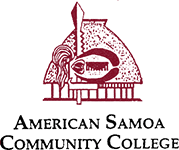American Samoa Community College MOODLE
15 Week Session
This course focuses on the in-depth study of manufacturing cost accounting with emphasis on the job order process, cost systems, the development of managerial skills in using accounting, and the financial information used to create budgets. Analyzing of material costs, labor costs, and manufacturing overhead costs will lead into the understanding of the cost-profit analysis in determining the breakeven points and the fixed and variable costs involved in cost accounting. (Note: 3 lecture credits)
- Teacher: Ioapo Taua'i
This course reinforces students’ knowledge of accounting concepts and principles through the use of computers. Instruction will be provided in computer operations using commercially available accounting software such as QuickBooks. Students should be able to utilize skills in entering data for the software to create financial reports, closing statements, and payroll accounting that will assist them in being hired for middle-level business jobs. A worksite experience of 25-30 hours is required for completion of the course. (Note: 3 lecture credits)
- Teacher: Maria Magalasin Luardo
Government and Not-For-Profit Accounting focuses on the development and use of financial information as it relates to governmental and not-for-profit entities. This course includes identifying and applying appropriate accounting and reporting standards for governments and private, not-for profit organizations, preparing financial statements for private not-for-profit organizations, and describing auditing requirements for these entities. (Note: 3 lecture credits)
- Teacher: Ioapo Taua'i
This course explores the US and American Samoa legal environment in which businesses operate, and studies the interaction between business and the legal system. Students examine various areas of the law which are important to business. Topics include the court system, government regulations, torts, contracts, agency, ethical and criminal implications of business actions, property laws, and the legal aspects of different business entities. (Note: 3 lecture credits)
- Teacher: Lam Yuen Lam Yuen
This course introduces students to economics as a way of thinking, observing, analyzing and identifying problems and their possible solutions. Topics include demand and supply, scarcity and prices, maximizing utility, production and costs, perfect competition, monopoly, antitrust and regulations, distribution of income, unions, market failure, public goods, international trade and financing, gross domestic product (GDP), gross national product (NPD), and the FED. (Note: 3 lecture credits)
- Teacher: Lam Yuen Lam Yuen
This course introduces students to the overview of economics and its key categories. Students will be familiarized with concepts and principles of the American economy. Topics will include opportunity cost, economic activities in producing and trading, supply and demand, prices and unemployment, real GDP, monetary and fiscal policies, economic stability, taxes and deficits, public debts, money and banking, natural and unemployed resources, and applying modern technology in solving and interpreting numbers and graphs. (Note: 3 lecture credits)
- Teacher: Maria Magalasin Luardo
This course introduces students to the development of individual and inter-personal relationships applied to business and industry. Emphasis is placed upon values, communication, problem-solving, motivation, leadership, and how individuals interact with each other within a group environment. In addition, human relations skills and organizational behavior concepts are examined within organization environments to better understand behavior, performance, learning, perception, values and diversity. Communication skills, conflict resolution, power, politics, and team dynamics are presented and analyzed within modern organizations. (Note: 3 lecture credits)
- Teacher: Lam Yuen Lam Yuen
This course introduces students to the development of individual and inter-personal relationships applied to business and industry. Emphasis is placed upon values, communication, problem-solving, motivation, leadership, and how individuals interact with each other within a group environment. In addition, human relations skills and organizational behavior concepts are examined within organization environments to better understand behavior, performance, learning, perception, values and diversity. Communication skills, conflict resolution, power, politics, and team dynamics are presented and analyzed within modern organizations. (Note: 3 lecture credits)
- Teacher: Lam Yuen Lam Yuen
This course is an overview of the social, economic and marketing environment in which advertising functions. It introduces the role of advertising and integrated marketing communication in society, business and economics. Topics include historical perspectives, ethics, research and evaluation, objective-setting, and strategies to planning the creation of campaigns for the mass and new media. It provides an opportunity for students to discuss and define their values within the practice of advertising. (Note: 3 lecture credits)
- Teacher: Maria Magalasin Luardo
This course offers opportunities for students to earn credit in directed work experience of 30 to 40 hours in either marketing and/or management within an approved business (private or public) agency approved by the department chair or instructor. Students will be required to file an exit report on work experience together with an approved Performance Evaluation by the work site employer. An off-island field trip or e- marketing research project is included for students to obtain direct observation or in-depth understanding on how various products are produced, packaged, stored, and distributed locally and globally. Emphasis is placed on the completion of a Business Plan being viewed and approved by a local or off- island business owner. (Note: 1 lecture credit and 1 lab credit)
- Teacher: Faofua Faatoafe
